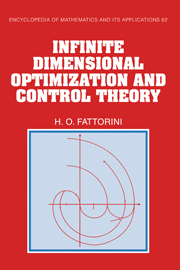Foreword
Published online by Cambridge University Press: 05 April 2013
Summary
An initial value or initial-boundary value problem for an evolution partial differential equation (an equation whose solutions depend on time) can usually be written as an abstract differential equation
in a suitable function space, the function f describing the action of the equation on the space variables, with boundary conditions (if any) included in the definition of the space or of the domain of f. The similarity of (1) with a true ordinary differential equation is only formal (f may not be everywhere defined, bounded or continuous) but gives heuristic insight into the problem, suggests ways to extend results from ordinary to partial differential equations and stresses unification, discovery of common threads and economy of thought. The “abstract” approach is not the best in all situations (for instance, many controllability results depend on properties of partial differential equations lost, or difficult to reformulate, in the translation to (1)), but it applies very well to optimization problems, where it is expedient to obtain general statements such as Pontryagin's maximum principle and then elucidate what the principle says for equations in various classes. Many of the techniques are (modulo some fine tuning) oblivious to the type of equation and are at least formally similar to classical procedures for systems of ordinary differential equations.
This work is on the Pontryagin's maximum principle for equations of the form (1), on its applications to diverse control systems described by partial differential equations, including control and state constraints and target conditions, and on other related questions such as existence and relaxation of controls.
Information
- Type
- Chapter
- Information
- Infinite Dimensional Optimization and Control Theory , pp. xiii - xviPublisher: Cambridge University PressPrint publication year: 1999
